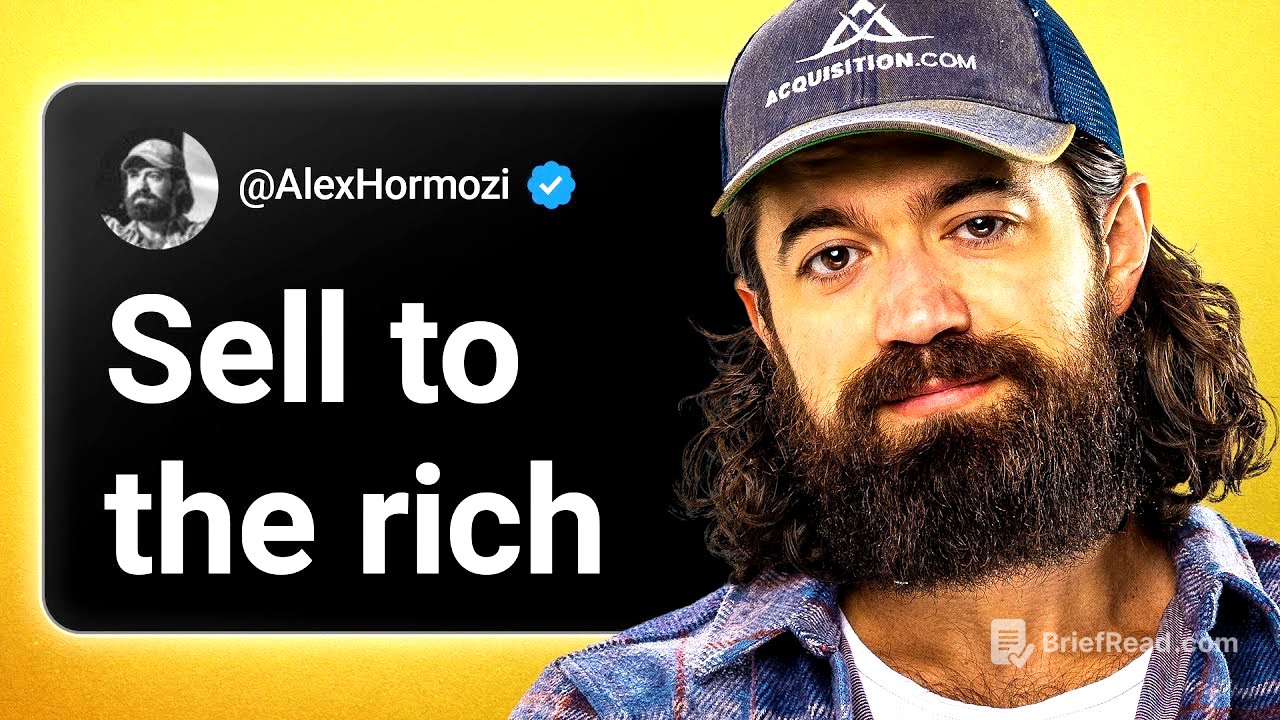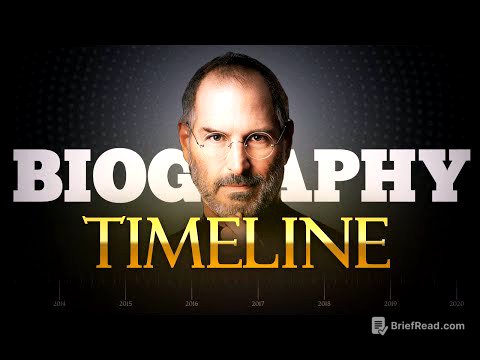TLDR;
This video is a compilation of Alex Hormozi's 13 years of business experience, offering brutal truths and lessons for entrepreneurs. He emphasizes selling to wealthy clients initially, focusing on solving their problems efficiently. The video also covers the importance of prioritizing tasks, building a strong team, and focusing on quality over rapid growth. Hormozi stresses the significance of brand building, understanding key business inputs and outputs, and avoiding the pursuit of fleeting "hacks." Ultimately, he advocates for investing in top talent and delivering exceptional value to customers.
- Sell to rich people first to build capital and infrastructure.
- Prioritize tasks and focus on solving the right problems.
- Build a balanced and talented team with high standards.
- Focus on quality and customer experience over rapid growth.
- Build a strong brand by delivering on promises and creating positive associations.
Sell to Rich People [0:15]
Alex Hormozi advises entrepreneurs to initially focus on selling to wealthy individuals. He argues that serving the middle market can be challenging due to high expectations relative to the price paid. Rich people are willing to pay more for value and convenience. Hormozi uses Tesla as an example, noting how they started with high-end products before moving to more affordable models. He suggests that solving rich people's problems allows for higher profit margins and the ability to over-deliver without needing extensive infrastructure.
Priorities, Not Information [8:58]
Hormozi emphasizes that entrepreneurs often lack clear priorities rather than information. He illustrates this with a story of an entrepreneur managing 56 companies simultaneously, which diluted his focus and resources. Strategy is about prioritizing resources against unlimited options. Hormozi advises defining the current state, desired state, and obstacles to solve problems effectively. He shares examples of businesses that struggled because they focused on the wrong problems or were solving problems they were comfortable with instead of what the business needed.
Your Team Isn't Good Enough [22:59]
Hormozi discusses the importance of building a high-quality team. He stresses that many entrepreneurs have low standards and that their best talent is yet to be hired. He shares a story of realizing the talent discrepancy between his team and a private equity firm during a business acquisition. He advises against having too many rules, as it indicates low standards and less capable team members. Hormozi references Amazon's rule of ensuring every new hire raises the average bar of the team. He also addresses the Peter Principle, where individuals are promoted to their level of incompetence, and suggests redefining roles or moving people aside to improve overall team performance.
Bigger Leads to Bloat [36:28]
Hormozi argues that focusing on getting better is more important than simply getting bigger. He contrasts Chick-fil-A's approach of prioritizing quality with Boston Market's rapid expansion, which led to bankruptcy. He emphasizes that quality will always win in the long run, provided it is priced appropriately. Hormozi shares Elon Musk's philosophy of entering a market with a product that is an order of magnitude better than existing solutions. He advises entrepreneurs to focus on improving each function of their business incrementally and consistently, creating a checklist of what makes their product or service exceptional.
Let Fires Burn [43:53]
Hormozi discusses the importance of time management and prioritization. He advises entrepreneurs to block time for work that moves the business forward and to avoid getting distracted by urgent but unimportant tasks. He shares anecdotes to illustrate that very few things are existential crises that require immediate attention. He prioritizes his day by focusing on the tasks that matter most and working uninterrupted for the first four to six hours. Hormozi also shares tactics for saying no to meetings and managing schedules effectively to protect focused work time.
Brand Takes Time [52:20]
Hormozi explains that brand building takes time but is the most valuable thing a business can do. He defines branding as the association people make between something they know and the business. He outlines three ways people make associations: what the company says or shows, what other people tell them, and what the customer experiences. He emphasizes that the customer experience is the strongest factor in building a brand. Hormozi also discusses how brand strength can be measured by how much above the commoditized price a company can charge.
Inputs and Outputs [1:02:33]
Hormozi stresses the importance of understanding the inputs and outputs of a business's money-making system. He advises breaking down processes to the smallest actions to identify constraints and opportunities for improvement. He explains that the skill of an individual is inversely proportional to how vague the direction is. Hormozi provides examples of how to analyze and improve advertising and sales processes by identifying and addressing specific bottlenecks.
Stop Looking for Hacks [1:10:21]
Hormozi advises against focusing on fleeting "hacks" and instead emphasizes the importance of quality and long-term strategy. He argues that it is better to spend more time making one exceptional thing than doing many things mediocrely. He explains that quantity matters because it teaches how much work it takes to create quality. Hormozi shares that quality is in the details and that entrepreneurs should focus on repeated refinement and improvement rather than quick fixes.
Best People Cost More [1:17:42]
Hormozi asserts that hiring the best people is one of the biggest Arbitrage opportunities in business. He shares personal examples of how hiring high-level employees resulted in significant returns. He emphasizes that small businesses must be worthy of the level of talent they need and have a mission that aligns with what those individuals find meaningful. Hormozi highlights how Elon Musk's businesses are positioned to save the world, attracting people who are willing to work hard for a meaningful cause.
The Big Obvious Thing [1:22:31]
Hormozi concludes by stating that the biggest, most obvious problem is often the one being avoided. He encourages business owners to confront the hard truths about their products or services and to focus on making them exceptional. He shares the story of Peloton's founders, who aimed to create a workout experience so good that people couldn't help but tell others about it. Hormozi advises against scattering focus on numerous details and instead prioritizing the core offering to achieve long-term success.








